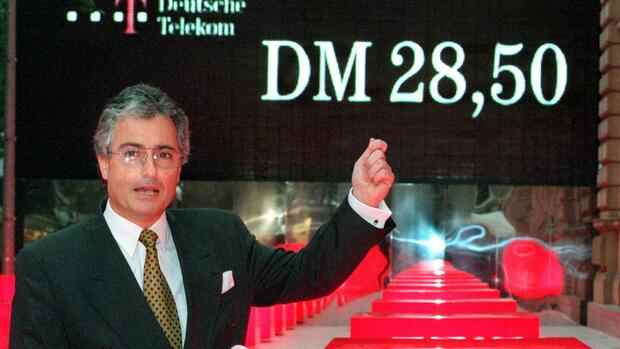The initial price of the Telekom share was 28.50 DM.
(Photo: dpa)
Exactly 25 years ago, with the support of the popular actor Manfred Krug, the T-Share was proclaimed an investment for everyone. After the initial euphoria about the so-called popular share, the great disillusionment followed. The course crashed. In addition, the Internet bubble burst and nothing was left of the hyped Neuer Markt, which seemed to establish a new German equity culture.
The shock was deep – and has not yet been overcome. The great financial crisis also contributed to the fact that Germans never lost their basic skepticism towards shares – on the one hand.
On the other hand, the anger about the world of negative interest rates ensures that private investors cannot help but deal with the share. They are increasingly entrusting their money to investment advisors from banks and savings banks or using their mobile phones to click into stock market events. Even the short, dramatic crash caused by the corona pandemic did not deter them for a long time, because an equally decisive recovery followed. Could that be the turn for a new equity culture?
Fund companies such as the Sparkasse subsidiary Deka are increasing their profit targets, and the German fund association BVI believes that a sales record with funds is possible this year. But how much equity culture has really developed has yet to be shown: Only when the stock exchanges are no longer booming, the portfolio value falls for a while, the action becomes frustrating, maybe even boring – only then will it become clear whether private investors are really ready for them Are stock exchanges.
Top jobs of the day
Find the best jobs now and
be notified by email.
Will you get out again only to get back in much too late later? Or do you keep your nerve and use phases of weakness for acquisitions?
As after the hype surrounding the T-Share, the stock markets have run extremely high today. Indices such as the German Dax, the European Stoxx 600 and the US S&P 500 are racing from record to record. There are more and more reminders of a setback.
The President of the ECB has taken over the loose interest rate policy of her predecessor Mario Draghi.
(Photo: imago images / Hannelore Förster)
There are enough risks: supply bottlenecks around the world, the question of whether the leading central banks can silently end their extremely loose monetary policy for the markets, and the renewed pandemic.
Shortly before the turn of the millennium, there were as many shareholders in the country as there are today: the Deutsche Aktieninstitut counted 12.9 million back then, today there are 12.4 million. A few years after the upswing at that time, a third of Germans had jumped again, often with portfolio losses after price slumps. It is to be hoped that private investors have learned a lot over the past 20 years or more.
More: Why analysts are optimistic about the T-Share on the anniversary of the stock exchange, of all things
